用所给动词的适当形式填空。1. We were looking forward to____ (visit) Shanghai World Expo .2. The law of gravity____ (discover) by Isaac Newton about 350 years -九年级英语
I didn''t know you were in Paris.我不知道你在巴黎。
(因为在说话时,我已经知道你在巴黎了。这句话指的是说话之前,所以只能用过去时表示。实际上,这句话暗指:But now I know you are here.)
I thought you were ill.我以为你病了呢。
(这句话应是在说话之前,我以为你病了。但是现在我知道你没病)
一变:肯定句变为否定句
技巧1.当句中含有情态动词或助动词could,would,should等时,可直接在其后面加not构成否定句。例如:
I could get you a concert ticket. → I could not / couldn't get you a concert ticket.
技巧2.当句中含有系动词was,were 时,可直接在其后加not构成否定句。例如:
I was on the Internet when you called me. → I was not / wasn't on the Internet when you called me.
技巧3.当句中谓语是除情态动词、助动词、系动词was, were以外的动词时,在该动词之前加did not / didn't,动词还原,构成否定句。例如:
The famous singer sang some Chinese songs. → The famous singer did not / didn't sing any Chinese songs.
二变:陈述句变为一般疑问句
技巧1.移动词语的位置。将was,were, could,would,should等移到句首。例如:
He could pack his things himself. → Could he pack his things himself?
技巧2.添加助动词did。谓语是除情态动词、助动词、系动词was, were以外的动词时,在主语之前加did,动词还原。例如:
Mr Li looked very old. → Did Mr Li look very old?
三变:陈述句变为特殊疑问句
技巧1.确定疑问词:人who / whom,物what,地点where,时间when / what time,原因why,频率how often,长度how long,距离how far等等。例如:
They gave the concert last night. → When did they give the concert?
技巧2.辨认结构形式:疑问词+情态动词/助动词/ was / were / did +主语+...? 例如:
The accident happened near the station. → Where did the accident happen?
考点名称:过去将来时
- 过去将来时:
表示从过去的某一时间来看将来要发生的动作或存在的状态。过去将来时常用于宾语从句和间接引语中。
去将来时的出发点是过去,即从过去某一时刻看以后要发生的动作或状态。 过去将来时表达法:
1. would+动词原形
例如:When you asked Li Lei for help, he would never refuse you.
2. was/were going to+动词原形
例如:He told ustaht he was going to attend the meeting.
3. was/were to+动词原形
例如:Li Lei was to arrive soon.
4. was/were about to+动词原形
例如:We were about to leave there when it began to rain heavily and suddenly.
5. was/were+现在分词
例如:He was leaving the next day.句型结构:
肯定句:主语+be(was,were)going to+动词原形~.
否定句:主语+be(was,were)not going to+动词原形~.
疑问句:Be(Was,Were)+主语+going to+动词原形~?
肯定句:主语+would(should)+动词原形~.
否定句:主语+would(should)not+动词原形~.
疑问句:Would(Should)+主语+动词原形~?
过去将来时的构成和一般将来时一样,只不过把助动词be变为过去式,把will,shall变为过去式。
例句:I didn''t know if he would come. =I didn''t know if he was going to come. 我不知道他是否会来。过去将来时具体用法:
一、would+不定式
1.用“would+不定式”表示过去将来时间通常带有表示过去将来的时间状语,而且多见于从属分句。
He said he would come back the next day.
2.如果要表示在过去将来某一时间正在进行得动作,可用“would+不定式进行体”。
例如:He never imagined that some day he would be living away from his motherland.
这种“would+不定式进行体”结构也可能仅仅表示一般过去过去将来时间,如同“will/shall+不定式进行体”表示一般将来时间一样。、
例如:He told me that Mary would be coming the next day.
如果要表示在过去将来某时以前业已发生得事态,可用“would+不定式完成体”。
例如:The delegation would have arrived by four o'clock that afternoon.
如果要表示从过去某时开始一直延续到过去将来某时得动作或事态,可用“would+不定式完成进行体”。
例如: She said that by the end of May she would have been studying medicine for three years
二、was/were going to +不定式
用做表示过去将来,也通常带有表示过去将来时间得状语。
例如: He said that he was going to live in the country when he retired.
用做表示的动作或事态,也可以是没有实现的意图。
例如:Last Sunday we were going to go for a picnic but it rained .
三、was/were to +不定式
用做表示过去将来,通常指按过去的计划安排将在某个过去将来时间发生得事态。
例如:They were not to get away with it if they continued to violate the law.
用作表示过去将来的安排,如果这个安排后来被取消了,没有实现,则用“was/were to +不定式完成体”表示,并可与表示现在、过去或将来得时间状语连用。 此外,其也可用作于表示以后不可避免得要发生得事件。
例如:They said goodbye,little knowing they were never to meet again.
四、was/were about to +不定式
用半助动词be about to 的过去时形式也可使其表示过去将来。这种结构通常指最近的过去将来事态,而且在一定语境中通常指未曾实现的意图:
例如:We were about to start when it began to rain .五、某些动词的过去进行时可表示过去将来时
come,go,leave,arrive,start等严格按照时间表发生的表起止的动词可用过去进行时代替过去将来时。
例1:He said the train was leaving at six the next morning.他说火车第二天早晨出发。
例2:She told me she was coming to see me.她告诉我她要来看我。六、特定场合的一般过去时可表示过去将来时
条件状语从句和时间状语从句中须用一般过去时代替过去将来时。
例1:I didn't know when she would come, but when she came I would let you know.我不知道她什么时候来,但她来了我会告诉你。
析:第一个when引导宾语从句,可使用将来时,第二个when引导时间状语从句,只能用一般过去时代替过去将来时。
例2:I didn't know if she would come,but if she came I would let you know.我不知道她是否来,但如果她来我会告诉你。
析:第一个if引导宾语从句,可使用将来时,第二个if引导条件状语从句,只能用一般过去时代替过去将来时。
- 最新内容
- 相关内容
- 网友推荐
- 图文推荐
| [家长教育] 孩子为什么会和父母感情疏离? (2019-07-14) |
| [教师分享] 给远方姐姐的一封信 (2018-11-07) |
| [教师分享] 伸缩门 (2018-11-07) |
| [教师分享] 回家乡 (2018-11-07) |
| [教师分享] 是风味也是人间 (2018-11-07) |
| [教师分享] 一句格言的启示 (2018-11-07) |
| [教师分享] 无规矩不成方圆 (2018-11-07) |
| [教师分享] 第十届全国教育名家论坛有感(二) (2018-11-07) |
| [教师分享] 贪玩的小狗 (2018-11-07) |
| [教师分享] 未命名文章 (2018-11-07) |

![Which of the following can you probably see in the meeting room? [ ]A. B. C.D. -七年级英语](http://www.00-edu.com/d/file/ks/4/2/dongmingci/2020-01-08/small97361980a56115e1c9237567439904fe1578422951.jpg)

![—Can the boy finish_____ the book in about a week? —I think he can. [ ]A. read B. reading C. to read D. reads -八年级英语](http://www.00-edu.com/d/file/ks/4/2/dongmingci/2020-01-08/smallfa4d713075e249356362fe7392193a301578421751.png)


